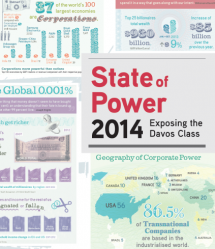State of our planet: Confronting the fateful triangle of big energy, finance, and complicit governments
Our inability to grapple with and adapt to our current ecological crisis has its roots in the world’s social and economic systems that concentrate power and authority in the hands of a few. We currently live in the “Corpocene Epoch,” due to the disproportionate role certain arthropods — directors of large corporations and Wall Street banks — play in the ecological transformations under way. Financial institutions, corporate powers and complicit governments have formed a “fateful triangle” accelerating the effects of climate change and preventing mitigation and adaptation strategies that could plug the gap between our volatile present and future planetary stability.

Descargas
Autores
Introduction: The Apex of the “Corpocene Epoch”
Scientists have begun labeling our current geological epoch as the “Anthropocene,” because of the impact humans are having on the Earth’s atmosphere. They have traced the rapid and volatile changes underway in the molecular composition of our atmosphere to the industrial revolution, when emissions of greenhouse gases — carbon dioxide in particular — began to soar.
Yet our inability to grapple with and adapt to our current ecological crisis has its roots in the world’s social and economic systems that concentrate power and authority in the hands of a few. An earth upon which the majority of human inhabitants determine the relationship between the human species and the biosphere could accurately be classified as “Anthropocene.”
However, we currently live in the “Corpocene,” due to the disproportionate role certain arthropods — directors of large corporations and Wall Street banks — play in the ecological transformations under way. Financial institutions, corporate powers and complicit governments have formed a “fateful triangle” — borrowing the phrase from the title of the famous book by Noam Chomsky — accelerating the effects of climate change and preventing mitigation and adaptation strategies that could plug the gap between our volatile present and future planetary stability.
Our current ecological crisis is commonly mistaken as a crisis of consumption for society at-large, which is partially true, as perhaps most vividly portrayed in Adam Curtis’ BBC documentary film series “The Century of the Self,” which showed how many western citizens have adopted a primary identity as consumers. Affluent countries, such as the United States and the United Kingdom, clearly have a higher carbon footprint per capita than that of poorer nations.
However there is still a huge disparity of carbon emissions within national populations in both industrialised nations like the US, as well as in new polluters like China. It’s these disparities that tend to muddle per capita figures. The thread that ties all nation- states together, though: jet-setting, mansion-loving members of the power elite, who have a disproportionate footprint no matter their country of origin.
“The Indian and Chinese elites both hide behind their own poor in resisting the demand for restraint on emissions,” explains TNI fellow Praful Bidwai unpacking the phenomenon. “And at the same time, they hide behind the rich in the North.”
Forbes Magazine’s estimates, for example, that the 400 wealthiest Americans have a combined net-worth greater than 155 million of their poorer counterparts in the US. A 2013 study from the journal Environmental Science & Policy found that the wealthiest ten-percent of the population accounts for twenty percent of greenhouse gas output linked to transportation. The study examined Germany but its authors say their research shows the link between wealth and emissions is universal.
Furthermore, decisions regarding what is consumed are not wholly made at the level of individual consumption, but largely in the boardrooms of corporations financed by large banks and private equity capital. Also, as ‘The Century of Self” made clear, it’s in the board rooms of large corporate public relations firms and advertising firms where the ideas are drawn up to create citizens-as-consumers.
The ecological crisis is a crisis of production and a question of who wields power. The mass manufacturing of automobiles, privatized transport, coupled with a disinvestment in mass transit, ensures the populace’s continued dependence on fossil fuels.
A study released by the Climate Accountability Institute ahead of the most recent United Nations Conference of the Parties to the Framework Convention on Climate Change reveals just ninety entities are responsible for 63-percent of total cumulative greenhouse emissions since the industrial revolution. Together these state-owned and investor-owned entities have played a leading role in driving concentrations of the heat-trapping gases to levels the planet has not seen for 800,000 years.